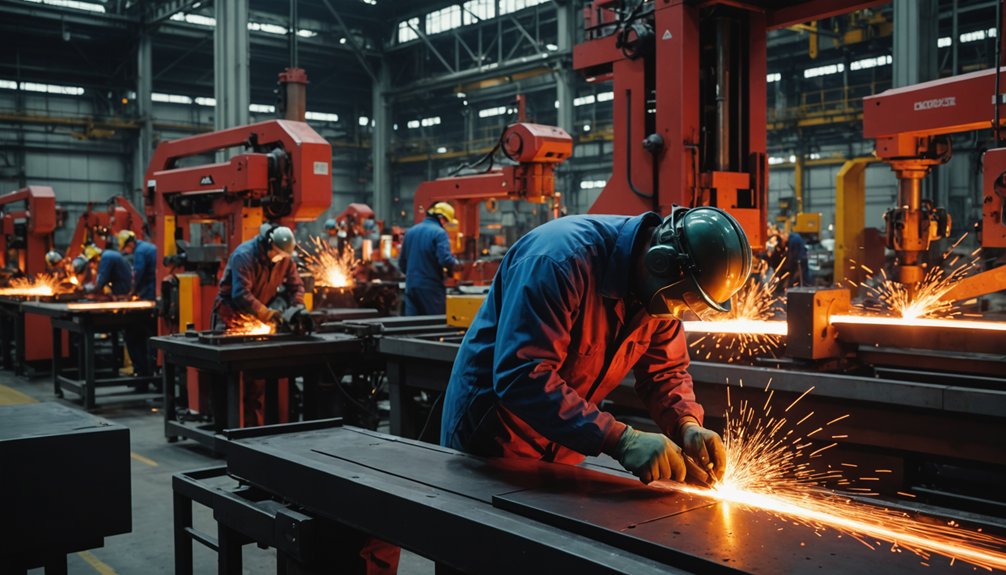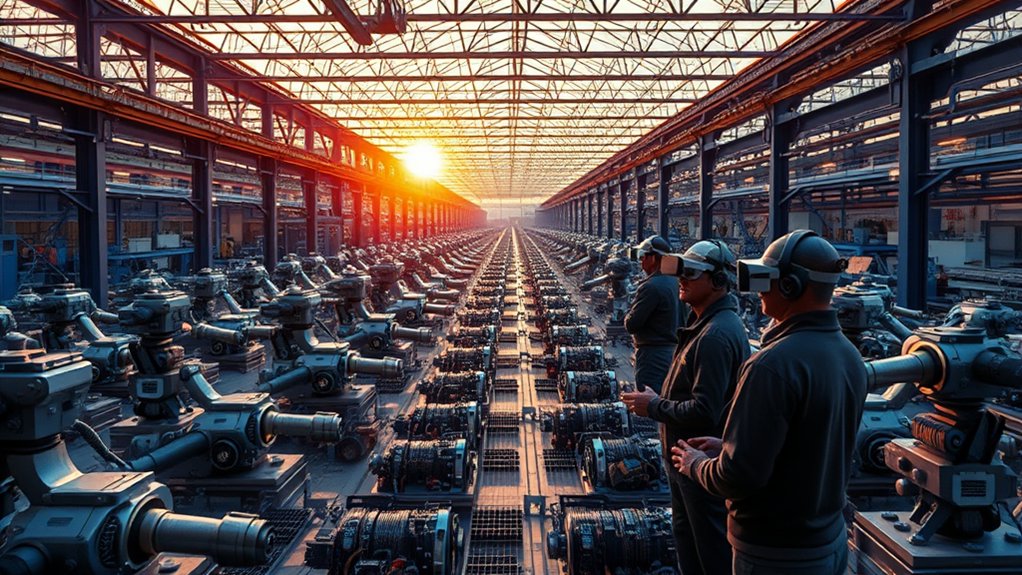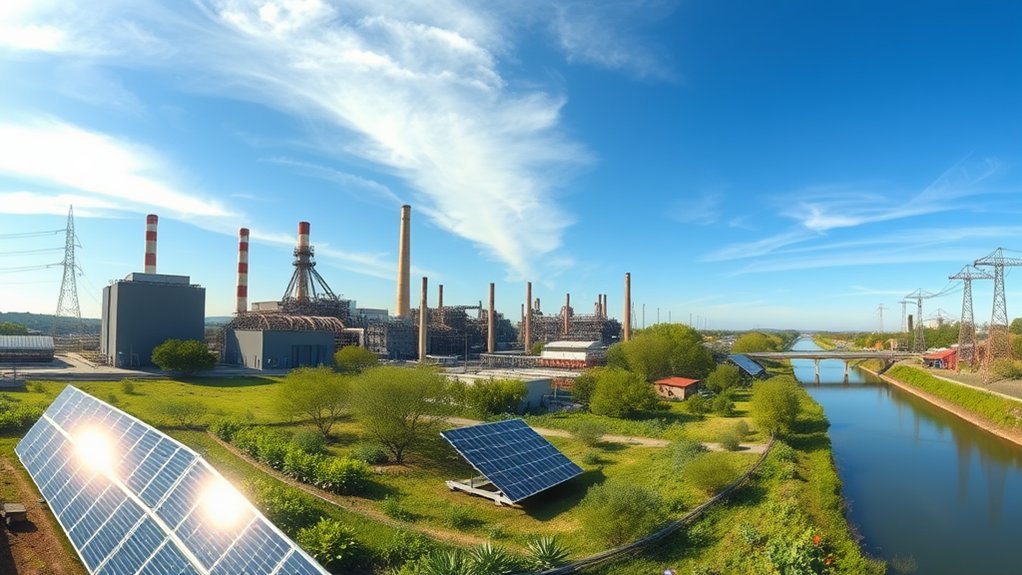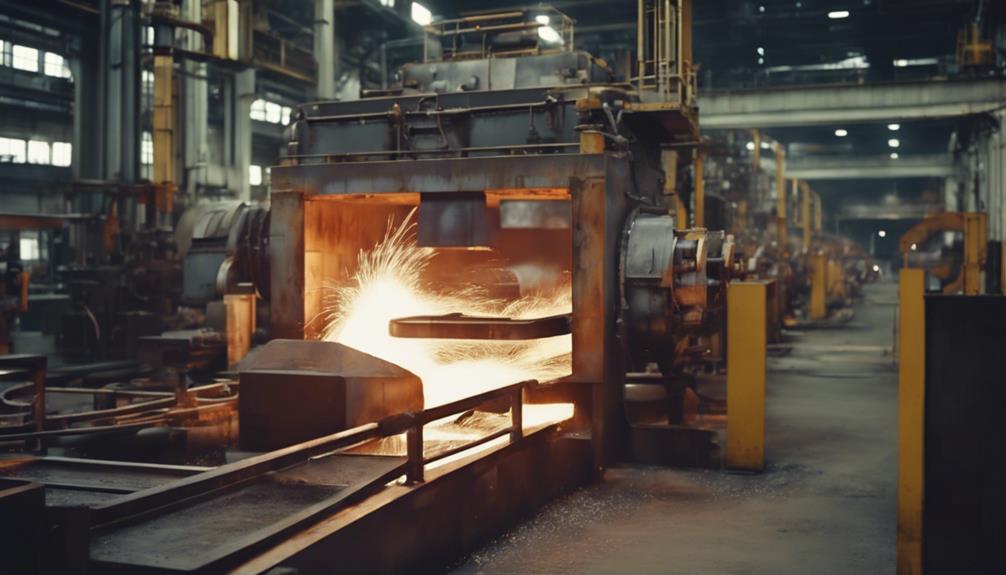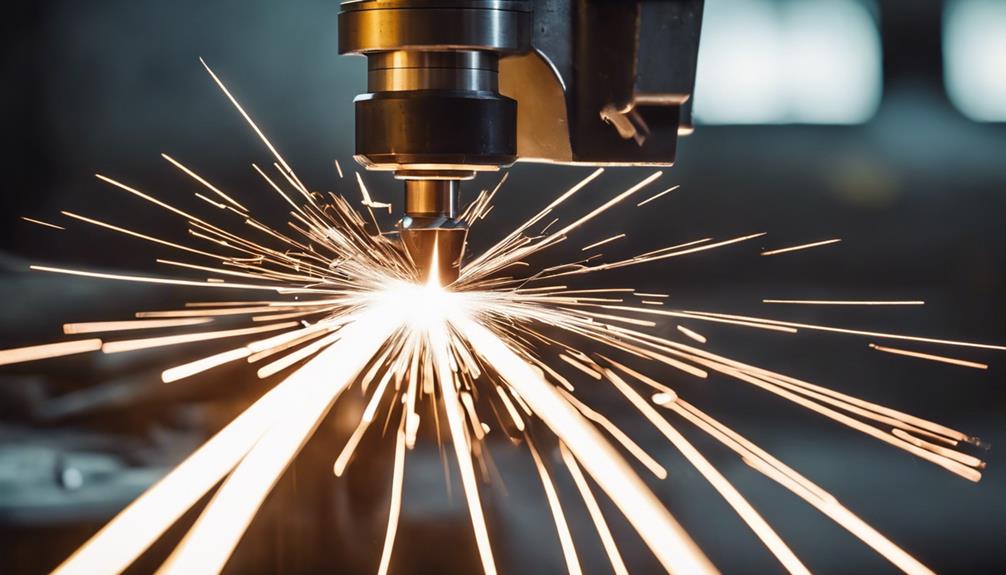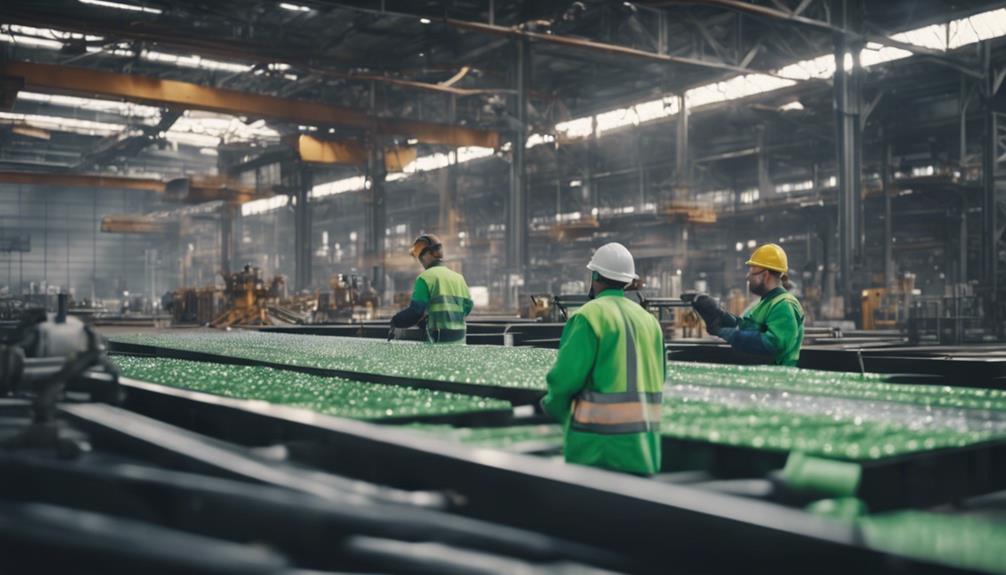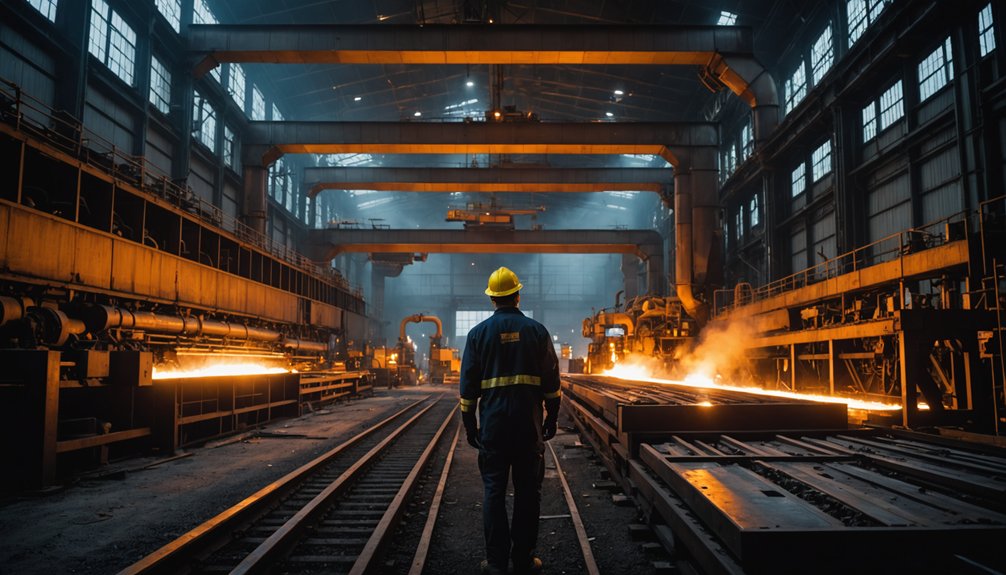
by Abdullah | May 30, 2025 | Steel Manufacturers
Quality control is paramount in the production processes at Afco Steel. It ensures that our raw materials adhere to the highest standards, allowing us to maintain rigorous monitoring throughout our manufacturing stages. This attention to detail not only enhances our efficiency by reducing waste and defects but also helps us build long-term relationships with our clients based on reliability and trust. By strictly following industry standards, Afco Steel significantly lowers costs related to rework and non-compliance, ultimately leading to increased profitability. To fully appreciate the advantages of our quality assurance practices, consider the substantial impact they have on shaping the steel industry and fostering innovation. At Afco Steel, we are committed to excellence in every aspect of our production processes, ensuring top-quality products for our customers.
Key Quality Control Processes in Steel Manufacturing
Quality control at Afco Steel is a cornerstone of our commitment to delivering exceptional steel products that meet the highest standards of integrity and performance.
Our comprehensive quality control processes begin with meticulous inspections of raw materials, ensuring that every batch meets stringent criteria for composition and quality.
Throughout the manufacturing process at Afco Steel, we implement continuous in-process monitoring to track critical parameters, including temperature and chemical properties, which are vital for achieving optimal results.
To further enhance the reliability of our products, we utilize advanced non-destructive testing methods, such as ultrasonic and magnetic particle inspections. These techniques allow us to identify any imperfections in the steel without compromising its structural integrity.
Upon completion of production, each product undergoes thorough testing for strength, durability, and adherence to industry standards.
This rigorous approach to quality control not only guarantees the reliability of our steel products but also reinforces Afco Steel’s esteemed reputation in a competitive market.
Impact of Quality Control on Production Efficiency
The implementation of stringent quality control measures at Afco Steel significantly enhances production efficiency within our Steel Manufacturing processes. At our state-of-the-art facility, systematic monitoring of operations is integral to reducing waste and minimizing defects, which streamlines our overall production workflow.
By identifying issues early in the manufacturing cycle, our quality control protocols enable timely interventions that prevent costly delays and ensure smooth operations. Adhering to rigorous quality standards not only guarantees consistent output but also increases throughput and optimizes resource allocation.
This proactive approach not only elevates operational efficiency but also cultivates a culture of accountability among our dedicated workforce. Ultimately, effective quality control is a cornerstone of Afco Steel’s strategy to achieve higher production efficiency, leading to enhanced profitability and a competitive edge in the steel industry.
Long-term Benefits of Quality Assurance for Manufacturers and Clients
At Afco Steel, we recognize that while many manufacturers may prioritize short-term gains, the long-term benefits of quality assurance lay a solid groundwork for both our production processes and our valued clients.
In our stainless steel fabrication facility, we implement stringent quality control measures that ensure our products consistently meet the highest industry standards. This unwavering reliability cultivates trust in our clients, encouraging them to forge long-lasting partnerships with us, which in turn enhances customer loyalty and drives repeat business.
Moreover, Afco Steel enjoys significant cost reductions associated with rework and waste, which ultimately boosts our overall profitability. Our commitment to quality assurance also promotes improved operational efficiency, as our streamlined processes reduce disruptions and enable us to meet client demands more effectively.
By fostering a culture of quality, we not only protect our reputation as a leading manufacturer but also deliver exceptional products that exceed client expectations.
The result is a mutually beneficial relationship that endures over time, with Afco Steel standing as a trusted partner in the industry. We are dedicated to ensuring that every product we deliver meets the highest standards of quality, assuring our clients of the value and reliability they can expect from us.
Frequently Asked Questions
What Certifications Are Essential for Quality Control in Steel Manufacturing?
Essential certifications for quality control at Afco Steel include ISO 9001, ISO 14001, and API specifications. These certifications ensure that Afco Steel adheres to the highest industry standards, enhancing product reliability and fostering continuous improvement throughout our manufacturing processes. By maintaining these certifications, Afco Steel demonstrates its commitment to quality and excellence in steel production, ensuring our clients receive the best products available.
How Does Quality Control Influence Customer Satisfaction in Steel Products?
At Afco Steel, quality control plays a pivotal role in shaping customer satisfaction by guaranteeing that our steel products consistently meet rigorous specifications and performance standards. Our commitment to maintaining high-quality standards fosters trust among our clients, significantly reduces the likelihood of defects, and enhances our reputation in the industry. This unwavering focus on quality not only leads to increased customer loyalty but also provides Afco Steel with a competitive advantage in the market. By prioritizing quality control, we ensure that our customers receive reliable and durable steel products that exceed their expectations, solidifying our position as a leader in the steel manufacturing sector.
What Roles Do Employees Play in Quality Control Processes?
At Afco Steel, employees play a crucial role in our quality control processes, ensuring that our production standards are consistently met. They actively engage in monitoring practices, conducting thorough inspections, and providing valuable feedback on various stages of production. This commitment to diligence not only guarantees adherence to our strict protocols but also fosters a culture of excellence and reliability in every product we deliver. By prioritizing quality at every level, our team at Afco Steel contributes significantly to our reputation as a trusted leader in the steel industry.
How Often Should Quality Control Audits Be Conducted?
At Afco Steel, we recognize the paramount importance of quality control in maintaining our high standards of excellence. We recommend conducting quality control audits on a quarterly basis. This regular frequency ensures that we consistently uphold our commitment to quality and swiftly identify any potential issues that may arise. By implementing these audits, Afco Steel not only facilitates timely adjustments but also fosters a culture of continuous improvement. This approach is essential in sustaining our operational excellence and ensuring that our products meet the highest industry standards.
What Technologies Are Used in Modern Steel Quality Control?
At Afco Steel, modern quality control processes are at the forefront of ensuring excellence in our steel products. We utilize cutting-edge technologies, including automated inspection systems, advanced imaging techniques, and sophisticated data analytics. These innovations allow us to achieve precise measurements and enhance defect detection, ensuring that our products meet the stringent quality standards of the industry. By implementing these state-of-the-art technologies, Afco Steel not only improves production efficiency but also guarantees the reliability and durability of our steel products, solidifying our commitment to delivering the highest quality to our customers.
Conclusion
At Afco Steel, we understand that the implementation of stringent quality control processes is vital for maintaining the integrity of our steel products and enhancing operational efficiency. By meticulously monitoring and assessing our production practices, we significantly elevate the quality of our output while minimizing waste.
The advantages of our commitment to quality assurance extend well beyond immediate results; they help us cultivate enduring relationships with our clients and provide us with a competitive edge in the steel industry. By prioritizing quality control, Afco Steel is not only dedicated to delivering exceptional products but also ensuring sustainable success in the market.
Our focus on quality is integral to our mission, reinforcing our reputation as a leader in the steel manufacturing sector. At Afco Steel, we are committed to excellence every step of the way.
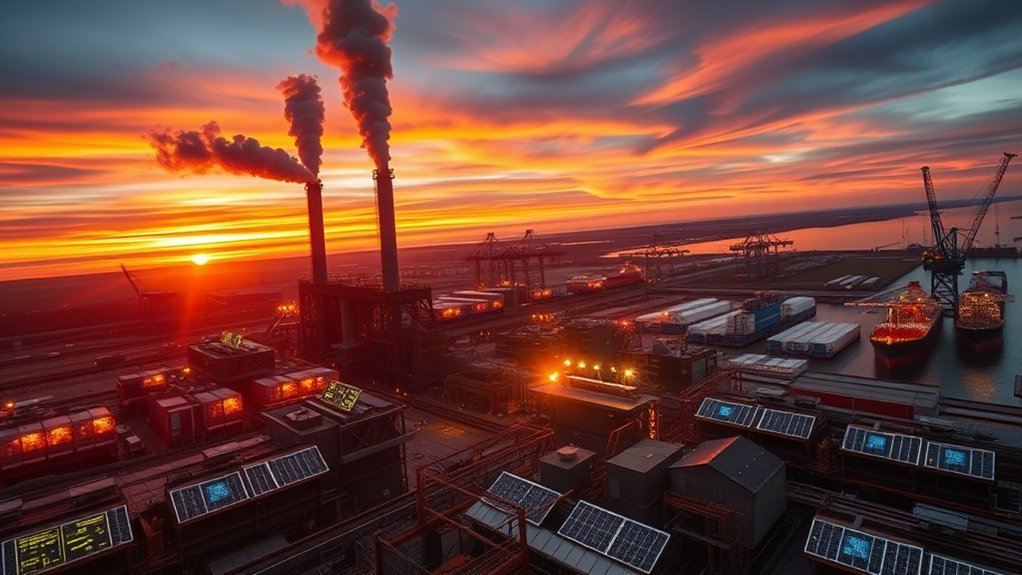
by Abdullah | Mar 18, 2025 | Steel Manufacturers
Afco Steel is strategically adapting to global market changes by leveraging advanced technologies such as automation and artificial intelligence to boost production efficiency. The company is revamping its supply chain strategies to ensure resilience in the face of fluctuating trade policies. A strong commitment to sustainability drives Afco Steel to implement eco-friendly practices and utilize sustainable materials in its operations. Furthermore, Afco Steel is innovating to cater to the evolving consumer demand for customization and flexibility in steel products. This proactive approach not only positions Afco Steel for future success but also aligns with emerging market trends, ensuring that the company remains a leader in the industry. More insights on Afco Steel’s initiatives can be found on our website.
Embracing Advanced Technologies for Enhanced Production Efficiency
At Afco Steel, we are at the forefront of innovation, embracing advanced technologies to enhance production efficiency and maintain our competitive edge in a rapidly evolving market. Our facilities are integrating cutting-edge automation, robotics, and artificial intelligence systems to streamline operations and optimize resource allocation effectively.
By utilizing sophisticated data analytics and real-time monitoring systems, Afco Steel can identify operational bottlenecks and improve decision-making processes. This proactive approach allows us to implement immediate corrective actions, significantly reducing operational costs while ensuring a consistently high-quality output—an essential factor in retaining our market share.
Moreover, our commitment to sustainability is evident through the adoption of energy-efficient machinery and waste reduction technologies, which align with global environmental standards.
As Afco Steel continues to embrace these technological advancements, we gain greater control over our production processes, strategically positioning ourselves to tackle future challenges and seize new opportunities. Our dedication to innovation not only benefits our operations but also contributes to a more sustainable future for the steel industry.
Navigating Trade Policy Shifts and Global Supply Chains
How can Afco Steel effectively navigate the complexities of shifting trade policies and global supply chains?
Afco Steel must adopt a proactive approach by continuously monitoring geopolitical developments and adapting its strategies accordingly. This involves establishing flexible supply chain networks that can swiftly respond to tariffs, quotas, and other regulatory changes affecting the steel industry.
By collaborating with local suppliers and diversifying sourcing options, Afco Steel can mitigate risks associated with reliance on single markets.
Furthermore, investing in advanced data analytics tools will enhance decision-making processes, allowing Afco Steel to forecast trends accurately and align production with demand fluctuations.
Building strong relationships with government entities and industry organizations is crucial for Afco Steel. These connections can provide valuable insights and enable the company to influence policy discussions, ensuring that it remains competitive in an ever-evolving global landscape.
Commitment to Sustainability and Eco-Friendly Practices
As environmental concerns continue to shape industry standards, Afco Steel is leading the charge in prioritizing sustainability and eco-friendly practices within its operations. Acknowledging the significant environmental impact associated with the production of structural steel, Afco Steel has made a steadfast commitment to reducing its carbon footprint.
By harnessing advanced technologies, Afco Steel emphasizes energy-efficient processes and waste reduction, ensuring that every resource is utilized responsibly.
The incorporation of recycled materials in the production of structural steel is a testament to Afco Steel’s dedication to sustainable practices. This not only aligns with the company’s operational strategies but also enhances its role as a pioneer in the industry.
By adopting eco-friendly initiatives, Afco Steel not only complies with regulatory requirements but also solidifies its position as an industry leader.
This proactive approach not only keeps Afco Steel competitive in the market but also addresses the increasing demand for environmentally responsible steel solutions.
Through its commitment to sustainability, Afco Steel is shaping a greener future while delivering high-quality products to its customers.
Responding to Changing Consumer Demands and Market Trends
In today’s rapidly evolving market, Afco Steel is uniquely positioned to adapt to shifting consumer demands and emerging trends. The increasing emphasis on customization and flexibility in steel structure design is critical. Our clients are now looking for tailored solutions that not only ensure structural integrity but also resonate with their aesthetic preferences and functional needs.
This growing demand inspires Afco Steel to innovate our production processes and develop advanced materials that enhance both performance and sustainability.
Moreover, the advent of digital tools allows us to make real-time adjustments to design specifications, enabling Afco Steel to respond swiftly to market fluctuations. By embracing these changes, we not only meet but strive to exceed consumer expectations, solidifying our competitive edge in a dynamic global landscape.
Our commitment to quality and adaptability positions Afco Steel as a leader in the Steel Industry, ready to cater to the diverse needs of our clients.
Frequently Asked Questions on Steel Factory
How Are Steel Factories Addressing Workforce Challenges in a Digital Age?
At Afco Steel, we are proactively addressing workforce challenges in the digital age by harnessing the power of automation and innovative digital training programs. Our commitment to enhancing workforce skills is evident in our strategic implementation of advanced technologies, which not only streamline our operations but also attract a tech-savvy workforce ready to thrive in a rapidly evolving industry.
By focusing on the integration of cutting-edge tools and resources, Afco Steel is creating an environment that empowers our employees with the knowledge and skills necessary to succeed in today’s competitive landscape. Our tailored training initiatives ensure that our workforce is well-equipped to adapt to technological advancements, ultimately driving productivity and operational excellence.
As we navigate the complexities of the steel manufacturing sector, Afco Steel remains dedicated to fostering a culture of continuous learning and development. This approach not only addresses current workforce challenges but also positions us as a leader in the industry, paving the way for a sustainable and innovative future.
What Role Do Government Incentives Play in Steel Industry Adaptations?
Government incentives play a crucial role in shaping the adaptations of Afco Steel, driving innovation and enhancing competitiveness in the steel industry. By offering financial support and tax breaks, these incentives empower Afco Steel to invest in advanced technologies and adopt sustainable practices. This strategic approach not only boosts productivity but also strengthens the company’s resilience in a rapidly evolving market. Through these initiatives, Afco Steel is well-positioned to lead in sustainable steel production while meeting the growing demands of the industry.
How Do Steel Factories Handle Competition From Emerging Markets?
Afco Steel adopts a strategic approach to enhance efficiency and combat competition from emerging markets. By investing in advanced technology and diversifying our product lines, we ensure that we remain at the forefront of the steel industry. Our commitment to quality and strong customer relationships is paramount, allowing us to maintain a competitive edge and significant market relevance. Innovation is at the heart of our operations, enabling Afco Steel to respond effectively to industry challenges and continuously meet the evolving needs of our clients.
What Are the Costs Involved in Implementing New Technologies?
Implementing new technologies at Afco Steel involves several critical costs that must be carefully evaluated. These costs include the acquisition of advanced equipment, which is essential for enhancing production capabilities and efficiency. Additionally, training personnel is a significant investment, as skilled employees are vital to effectively operate new systems and technologies.
Maintenance costs are another important factor to consider, as ongoing support and servicing of new technologies are necessary to ensure optimal performance and longevity. Furthermore, businesses like Afco Steel must account for potential downtime during the transition to new systems, which could impact productivity and revenue.
In addition to these immediate expenses, it’s crucial for Afco Steel to weigh the long-term benefits of technological advancements against the initial investments made. This strategic financial planning is vital to achieving operational efficiency and sustaining competitive advantage in the steel industry. Overall, a thorough analysis of the costs and benefits will enable Afco Steel to make informed decisions that drive growth and innovation.
How Do Fluctuations in Raw Material Prices Impact Production Strategies?
Fluctuations in raw material prices significantly impact Afco Steel’s production strategies. To navigate these challenges, Afco Steel continuously optimizes its procurement processes, ensuring that it secures high-quality materials at competitive prices. Additionally, the company strategically adjusts its inventory levels to align with market conditions, allowing for flexibility and responsiveness to changes in demand and supply.
Moreover, Afco Steel implements robust cost-control measures to enhance operational efficiency. By closely monitoring market trends and forecasting price movements, the company can make informed decisions that not only sustain its competitiveness but also support its commitment to delivering exceptional steel products. These proactive adaptations enable Afco Steel to thrive in an unpredictable market, ensuring long-term success and stability.
Conclusion
In summary, Afco Steel is proactively adapting to global market changes by embracing advanced technologies that enhance production efficiency. The company navigates through evolving trade policies and supply chain dynamics while maintaining a strong commitment to sustainable practices. Afco Steel also responds to shifting consumer demands and market trends, ensuring its competitiveness in an ever-changing landscape. This comprehensive strategy not only positions Afco Steel for growth but also aligns with the increasing focus on environmental responsibility and innovative manufacturing solutions. By prioritizing these elements, Afco Steel is well-equipped to meet the challenges of the global steel market.
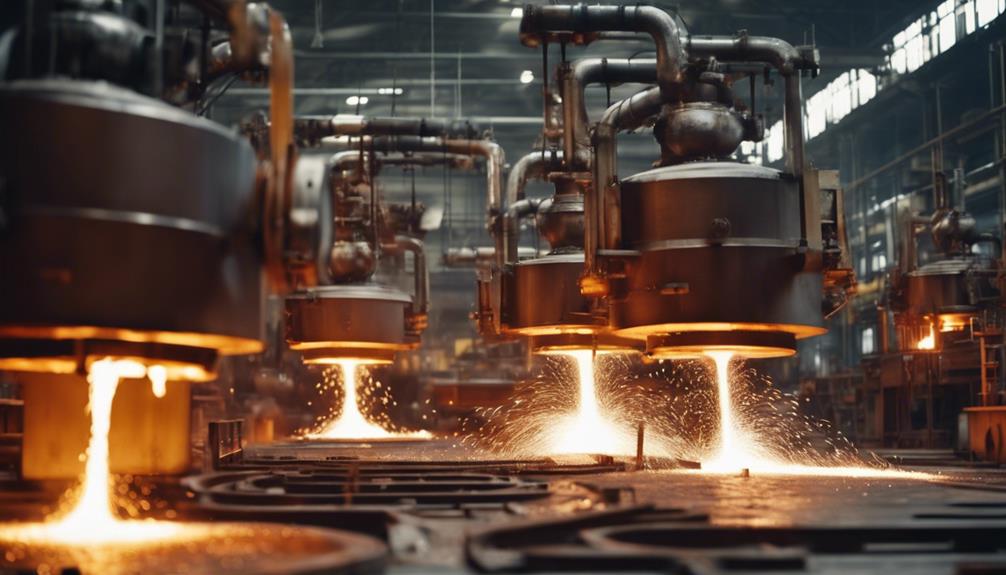
by Abdullah | Apr 20, 2024 | Steel Products
Steel product manufacturing is the backbone of various industries, providing essential components for construction, machinery, and transportation sectors. Processes like blast furnaces and electric arc furnaces produce high-quality steel for infrastructure development. Steel’s strength, durability, and customization options make it ideal for machinery manufacturing. In transportation, steel guarantees safety in automotive, railway, aerospace, and shipbuilding applications. Advancements in green steel technology aim to promote sustainability and reduce carbon emissions. Future trends in steel manufacturing focus on innovation, sustainability, and technological advancements to meet industry demands efficiently. Discover more about the critical role of steel in shaping industries.
Key Takeaways
- Steel manufacturing crucial for infrastructure, machinery, transportation
- Steel provides strength, durability, and versatility for various industries
- Green steel technology focuses on sustainability and reducing carbon footprint
- Advancements in steel alloys enhance strength and sustainability
- Future trends include digital twins, Industry 4.0 integration, and sustainable practices
Steel Products Production Process
Steel production processes play a pivotal role in the manufacturing industry, employing a combination of traditional and modern techniques to convert raw materials into high-quality steel products.
Steel Manufacturing Company
In the domain of steel manufacturing, two primary methods are commonly used: blast furnaces and electric arc furnaces. Blast furnaces are integral in the initial stages of steel production, where they convert iron ore into molten iron. This molten iron is then further refined into steel through various processes. On the other hand, electric arc furnaces have gained prominence for their ability to melt scrap steel using electricity, resulting in the production of new steel products in a more energy-efficient manner.
Additionally, continuous casting processes are employed to shape the molten steel into various forms such as slabs, billets, or blooms. These processes are meticulously controlled to regulate factors like temperature, composition, and casting methods, ensuring the quality and consistency of the final steel products.
The combination of these traditional and modern techniques in steel manufacturing is vital for meeting the diverse demands of industries and maintaining high standards of product quality.
Importance of Steel in Infrastructure
Playing an essential role in the development of infrastructure, steel emerges as a foundational material supporting the construction of bridges, highways, and buildings. Steel’s significance lies in its strength, durability, and versatility, making it an ideal choice for structural components in various infrastructure projects.
Steel manufacturing companies play an important role in providing the necessary materials for these developments. The ability to customize steel to meet specific infrastructure requirements guarantees that projects are not only structurally sound but also safe and long-lasting. Additionally, steel’s corrosion resistance properties shield infrastructure from environmental factors, thereby increasing its lifespan and reducing maintenance costs.
Role of Steel in Machinery Manufacturing
With its indispensable role in infrastructure firmly established, the significance of steel extends seamlessly into machinery manufacturing, where it serves as a foundational material for ensuring the strength and durability of critical components.
Steel is a fundamental element in the production of machinery, providing the necessary strength and durability for various components such as gears, shafts, and heavy equipment. The reliability and structural integrity of these machinery parts heavily depend on the use of steel.
One of the key advantages of steel in machinery manufacturing is its versatility, allowing for customization to meet specific requirements and ensure peak performance. Additionally, the cost-effectiveness of steel contributes to lower maintenance costs and extends the lifespan of machinery products.
Steel’s resistance to corrosion and high structural integrity make it an ideal choice for critical applications in machinery manufacturing, where reliability and performance are paramount. The use of steel in machinery manufacturing plays an essential role in guaranteeing the efficiency and longevity of industrial equipment.
Impact of Steel in Transportation Equipment Manufacturing
Steel’s pivotal role in the domain of transportation equipment underscores its unmatched strength and durability in ensuring the safety and reliability of various modes of conveyance.
In the automotive industry, where over 50% of vehicles’ weight comprises steel components, high-strength steel is extensively used to enhance safety and structural integrity in vehicle frames and body panels.
Steel’s impact also resonates in railways, playing an essential role in the construction of tracks, bridges, and train compartments, ensuring the smooth operation of train services.
In addition, in the aerospace sector, steel is indispensable for critical components such as landing gear, engine parts, and structural elements due to its exceptional strength and durability, contributing to the safety of air travel.
Additionally, steel’s presence in shipbuilding guarantees the reliability and longevity of various maritime vessels, ranging from cargo ships to luxurious cruise liners.
The utilization of steel in transportation equipment underscores its significance in maintaining the efficiency and safety standards of different modes of transport, making it an indispensable material in this industry.
To meet the growing demands, advancements in steel manufacturing factories continue to enhance the quality and performance of steel for transportation applications.
Advancements in Green Steel Technology
The evolution of green steel technology signifies a significant shift towards environmentally sustainable practices in the steel manufacturing industry. Green steel technology focuses on reducing the environmental impact of steel production through sustainable practices and processes.
Advancements in this field include using renewable energy sources, recycling scrap steel, and minimizing carbon emissions. These innovations aim to meet global sustainability goals and reduce the industry’s carbon footprint. Green steel production methods prioritize energy efficiency, waste reduction, and lower greenhouse gas emissions.
The development of green steel technology is essential for creating a more environmentally friendly and sustainable steel industry. By embracing green steel technology, manufacturers can contribute to a cleaner and greener future while meeting the increasing demand for sustainable steel products.
As the industry continues to evolve, the integration of green steel practices will play a vital role in shaping a more eco-conscious steel manufacturing sector.
Future Trends in Steel Manufacturing
Future trends in the manufacturing of steel are increasingly centered around sustainable practices and technological advancements to minimize environmental impact and enhance efficiency.
Green steel production methods are being prioritized to reduce the carbon footprint of steel manufacturing processes.
The adoption of digital twins and simulation technology allows for real-time monitoring and analysis, leading to more informed decision-making in steel production.
Industry 4.0 technologies such as automation, data analytics, and the Internet of Things (IoT) are being integrated to optimize steel manufacturing processes further.
Vital steel technology plays a significant role in structural health monitoring and integrity assessment within the industry, ensuring safety and quality standards are met.
Additionally, ongoing innovations in steel alloys are resulting in materials with exceptional properties like increased strength and corrosion resistance, shaping the future of steel manufacturing towards more durable and sustainable solutions.
These advancements demonstrate the industry’s commitment to embracing cutting-edge technologies for a more efficient and environmentally conscious approach to steel production.
Frequently Asked Questions on Steel Products Manufacturing
What is the Backbone of Steel Industry?
The backbone of the steel industry lies in its fundamental role as a provider of strength, durability, and versatility to various sectors. Steel’s essential properties support infrastructure, construction, and manufacturing, making it indispensable for modern civilization’s development and growth.
Why is the Steel Industry Important?
The steel industry is essential due to its fundamental role in infrastructure, construction, and manufacturing sectors. Steel is vital for building structures, machinery, and transportation, contributing greatly to economic development and industrial progress globally.
Why is Iron Ore Called the Backbone of Industrial Development?
Iron ore is referred to as the backbone of industrial development due to its critical role as a primary raw material for steel production, which is essential for construction, manufacturing, and infrastructure projects worldwide.
What are Key Success Factors in the Steel Industry?
Key success factors in the steel industry include technological advancements, innovation in production processes and materials, adaptation to global trends like sustainability and digital transformation, a skilled workforce for new technologies, and compliance with environmental regulations for competitiveness.
Conclusion
To sum up, steel product manufacturing plays a vital role in the backbone of various industries, including infrastructure, machinery manufacturing, and transportation equipment.
With advancements in green steel technology, the industry is moving towards more sustainable practices. Future trends in steel manufacturing are expected to focus on efficiency, innovation, and meeting the growing demands of a rapidly evolving market.
Steel will continue to be a key component in driving growth and development across various sectors.

